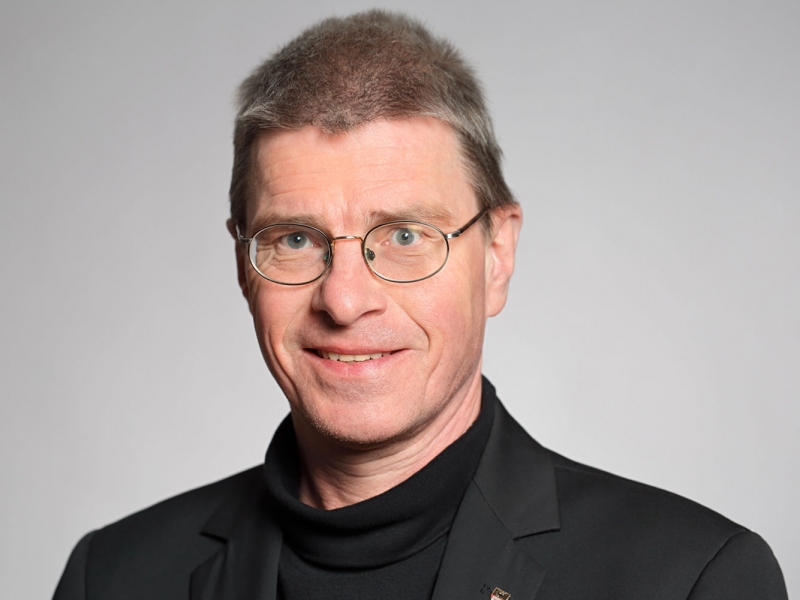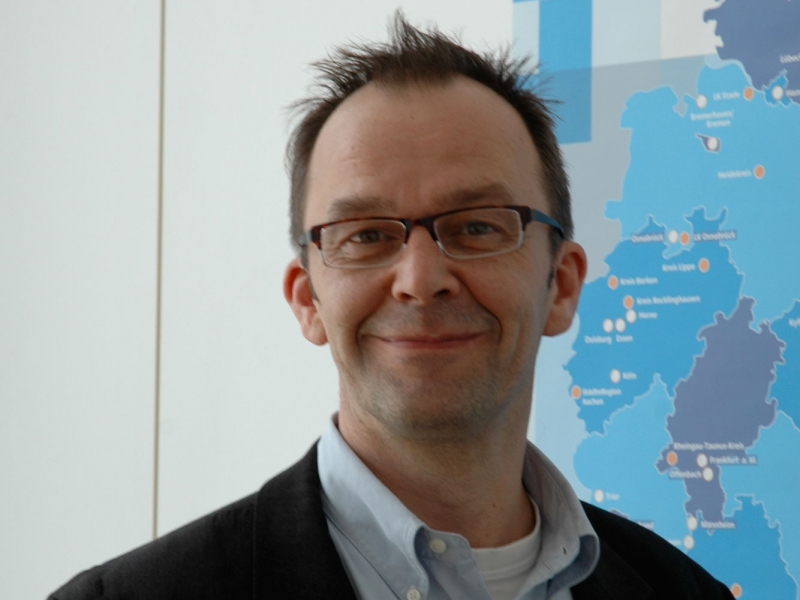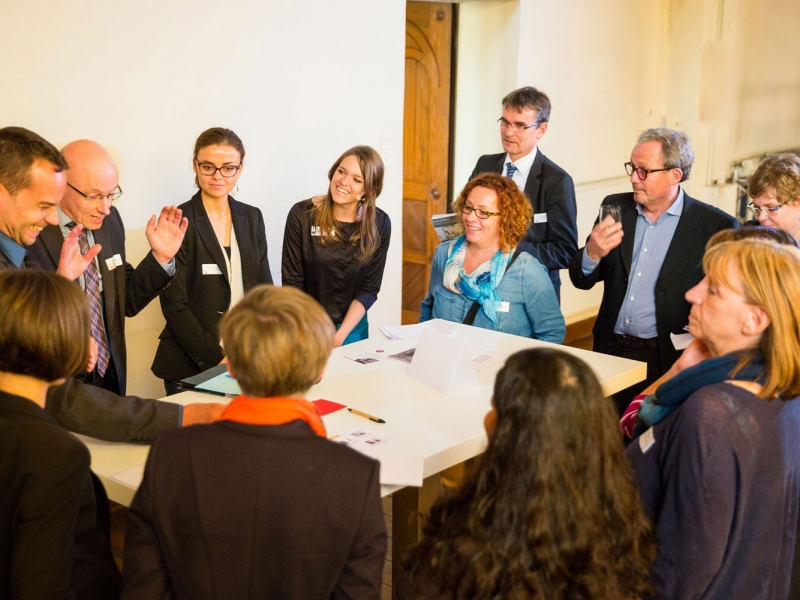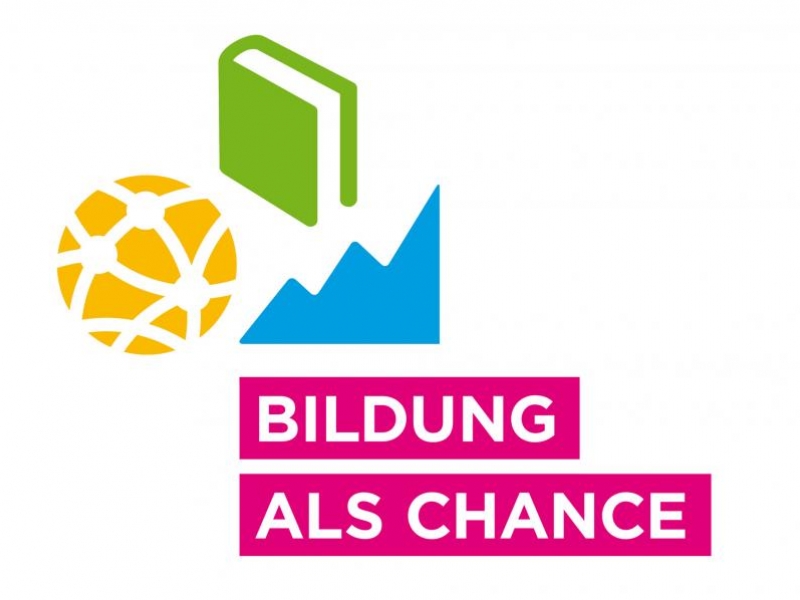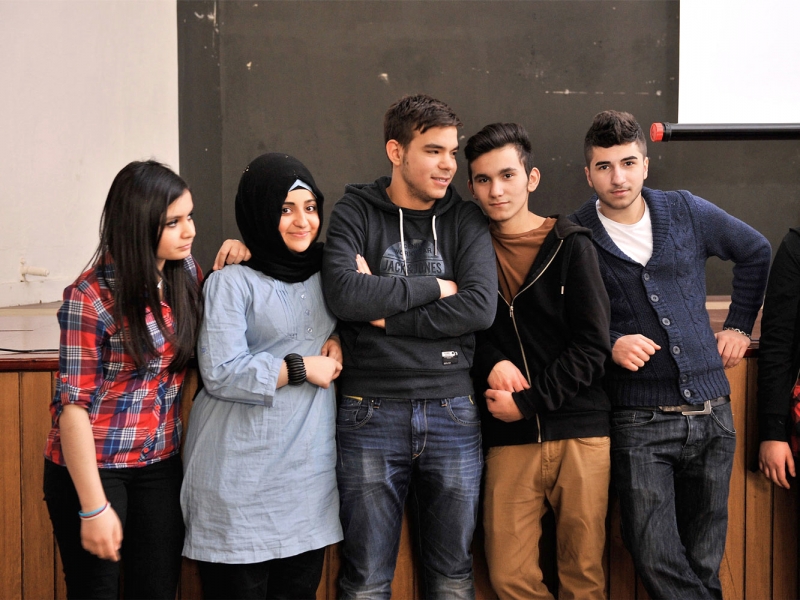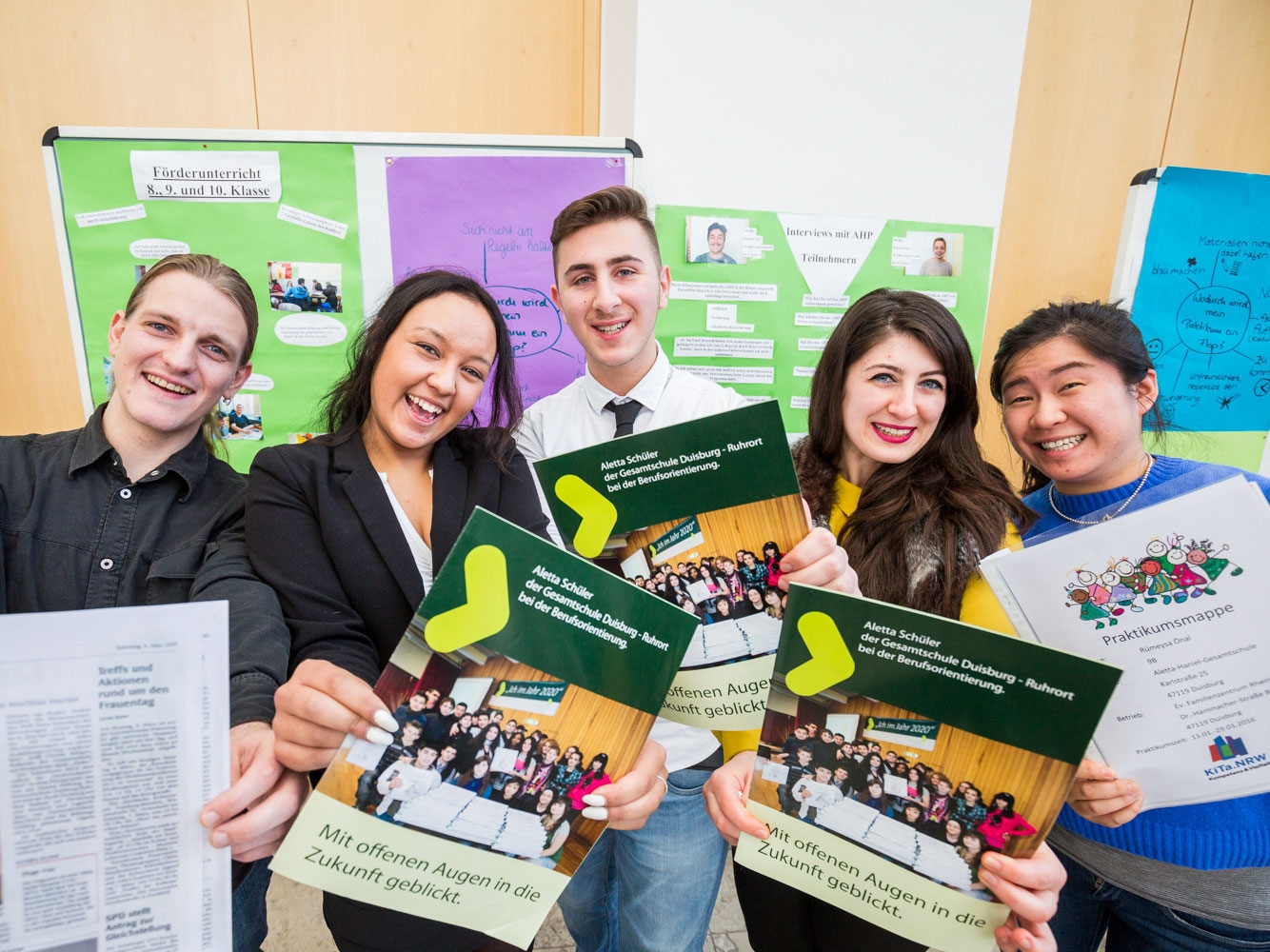
Educational Opportunities
Empowering Duisburg
Where you come from determines where you go – in Germany, this is especially poignant for students. Children from weak social environments are at a disadvantage in the German school system. In cities like Duisburg, where the social decline is prevalent and school dropout rates are above the national average in Germany, the Haniel Foundation – together with players from the worlds of politics, society, and business – is committing itself to leveling the playing field and creating opportunities.
According to the Federal Ministry of Education and Research, success in school in Germany is more dependent upon heritage and family income than in any other industrialized nation. The supposedly neutral achievement benchmarks for students are significantly more difficult for children from less privileged homes to fulfill.
There are various reasons why students start off on an uneven playing field. Some students have never spoken a word of German when they start school. Some come from families with financial struggles, which can result in topics like school being put on the back burner. “That is why many children, when they start school, don’t know how to sit down quietly, concentrate, and hold a pen or pencil in their hand,” says Dr. Rupert Antes. The executive director of the Haniel Foundation has been working in the field of education in Duisburg – a city that desperately needs funding – for more than 15 years.
The metropolis on the Ruhr River has to deal with some difficult conditions. Although Duisburg does have a good social and cultural infrastructure, its public perception is characterized by negative events. Since the Love Parade catastrophe in 2010, Duisburg’s municipal administration has been associated with poor organization and a lack of responsibility. In 2015, a TV report took apart the neighborhood of Duisburg-Marxloh and called it a lawless area – even the police are hesitant to venture in. Additionally, Duisburg suffers from the typical prejudices associated with the Ruhr region. Many people still see images of coal dust and sleeveless undershirts – especially if they have never actually been to the city. Unlike Berlin, Duisburg is considered poor – but not sexy.
The coffers of the city on the Rhine are indeed empty – it is one of the poorest cities in the Ruhr region. According to the social report of 2016 for North Rhine-Westphalia, the default rate is 16.2 percent. On top of that, a high unemployment rate of 13.1 percent has been burdening Duisburg since the decline of mining and the steel industry. “Prior to the structural shift, people in Duisburg could find work and make a living even without graduating or qualification,” says Klaus Peter Müller, head of the education office in Duisburg. “And these jobs are now gone.”
With Hope for Happiness
The difficulties of dealing with this structural shift and transforming Duisburg into an educational center are only exacerbated by the refugee situation and the intra-European immigration of people from southeast Europe. No other German community has taken in as many new residents from this area since 2012. Today, more than 16,000 people from southeast Europe – primarily Bulgarians and Romanians and including many children – live among the 492,000 residents of Duisburg. Hoping for work, protection from discrimination and violence, or better opportunities for their children, immigrants try to gain their footing in parts of the city such as Duisburg-Hochfeld or Duisburg-Marxloh.
In Marxloh, they believe they will easily find work and affordable housing. This is according to a study conducted by the N.U.R.E.C. Institute, the Network on Urban Research in the European Union. Once the immigrants arrive there, they are faced with a different reality. Apartments are run down, and there is not much work for people with few qualifications. The city’s urban data provides some insight into the situation of poverty in the quarter: just under half of the city’s residents are reliant on government support. Even with gainful employment, their salaries are often insufficient to make ends meet.
Many immigrants appear to have trouble integrating into Duisburg’s society under these conditions. Thomas Krützberg, head of the department for culture, education, and family, says that it is difficult to reach a majority of people. In his experience, the usually low level of education makes integration even more difficult. Plenty of people are making an effort, but he does not want to trivialize the problems in the individual parts of the city: “Some people first have to understand that you can’t throw trash out the window onto the street, you can’t let your kids party in the street at 3 a.m., and that there is such a thing as a kindergarten.” Dr. Rupert Antes of the Haniel Stiftung and head of the education office Thomas Müller report similar experiences. Parents and their children often have to be taught that regular attendance in school is essential for educational success.
© Duisburg Kontor GmbHThomas Krützberg is head of the department for culture, education, and family in Duisburg
For Duisburg, the massive immigration undoubtedly brings significant challenges with it. Nonetheless, both the city and the Foundation recognize which opportunities the new residents of the Ruhr metropolis can bring. If the potential of the children is recognized and promoted, and their families are integrated into society, Duisburg will be well positioned to combat the lack of skilled technical workers looming due to the demographic changes and for an inclusive society. Not only does the economy benefit from this, but also the common good of the city. That motivates the players in the field of education to take a closer look: Where can they get involved in order to help make a change?
Ensuring Education Is Completed
The conditions in Duisburg’s problematic neighborhoods are reflected in the city’s educationally relevant figures. More than seven percent of students leave school without a diploma. With this rate, Duisburg is above the national average of 5.6 percent. But beginning a career is difficult even with a diploma. Unlike the other big cities in North Rhine-Westphalia, the demand for apprenticeships in Duisburg is greater than the supply. This results in a high rate of unemployment among young people. In June 2016, nearly 3,000 young people were out of work.
Despite the difficult financial situation, the city responded to its low ranking in education with great commitment. Since Mayor Sören Link took office in 2012, more emphasis has been placed on education, explains education department head Thomas Krützberg. In a management sense, that means education conferences, education consortia, and school development planning.
© Stadt DuisburgKlaus Peter Müller is head of the education office in Duisburg
And the education office is a part of these measures. Klaus Peter Müller, the office’s director, hopes to change the figures in the medium term. With a tight budget, that mainly means: “Networking the players and disseminating knowledge and information among them in order to ensure education is completed,” says Müller. This is a task that the city is taking on with the help of various educational partners whose objective is to safeguard education in such a way that it correspond to the learning potential of the students. The Haniel Foundation is a key partner to the city in this process. In following with entrepreneurial tradition of the founding company Haniel, the Foundation advocates for equitable educational opportunities in Duisburg.
Demonstrating Responsibility
Corporate support has a history in Duisburg. The first schools, health insurance companies, and hospitals for workers were founded by the large companies headquartered there. Entrepreneur Franz Haniel was acting in accordance with the principles of the honorable merchant when, in 1856, he established a school and a fund for talented young people in Duisburg whose parents could not afford tuition. Today, Haniel is one of the largest family-owned companies in Europe – and still feels an obligation to Duisburg and the people who call Duisburg home.
For the city, the coordinating and financial support from private, entrepreneurial, and nonprofit organizations, as well as foundations, is essential: “Without them, many urgently necessary projects would not be possible,” says education department head Krützberg. In this context, partners who provide long-term and sustainable funding are especially valuable.
The Haniel Foundation strives to live up to this standard. Its funding is intended to, on the one hand, enable young talents to get involved for the common good and to solve the most urgent problems in the area of education. On the other hand, its support is directed at those educationally disadvantaged children and youths who are in danger of not graduating. Due to the unique situation of education in the city as well as tradition, the Foundation concentrates on the city of Duisburg when it comes to education funding in order to make a difference. Contrary to the so-called watering-can concept, which involves evenly distributing funds across a target group without consideration of the possible urgency of individual cases, the Haniel Foundation structures its efforts in such a way as to allow targeted support in those areas where it is most needed.
With three projects, the Haniel Foundation is addressing students in various phases of their education. It strengthens the individual educational paths and strives to prevent students from dropping out. To date, two of these projects are based at the Aletta-Haniel-Gesamtschule in Duisburg-Ruhrort – a school in dire need of funding. For Bildung als Chance project (education as an opportunity), which is the largest thus far, the Haniel Foundation has networked with three social entrepreneurs, one nonprofit organization, and representatives from the community in order to reach even more children and young people in the city.
Working Together – Not alongside Each Other
“So that we can sustainably fund projects and achieve mass effectiveness, they have to be carried out through collaboration,” explains executive director Dr. Antes. For this reason, the Haniel Foundation relies on partnerships and – with the Bildung als Chance collaborative project – has developed one of the first collective impact projects in Germany.
© Alexander MuchnikNetworking event with Bildung als Chance: Actors from different spheres gather and exchange their practical knowledge on education to effect change.
Together with Ashoka Germany, a nonprofit organization for the promotion of social entrepreneurism, the Foundation coordinates the collaborative work of three social entrepreneurs: apeiros e.V., Teach First Deutschland gGmbH, and Chancenwerk e.V. They combine their efforts for the betterment of future opportunities of educationally disadvantaged children.
Collective impact means truly working together rather than simply alongside each other and taking on one another’s responsibilities. “In this way, the achievements of the individual organizations are not just patchwork,” says Dr. Rupert Antes. “Working with the city and other central players in education in Duisburg is also important to us.” With a high degree of finesse, the Foundation strives to play the role of innovator for schools and the city. Klaus Peter Müller from the education office considers the commitment and input of the Haniel Foundation to be extremely important to united efforts towards a common goal for Duisburg.
“Ideally,” explains Dr. Antes, “social entrepreneurs will want to solve the problems they are involved with, thus making themselves unnecessary.” According to the executive director, this approach may not be a panacea, but it is sustainable and efficient – and therefore also relevant for the Foundation. Individual studies are already showing the effectiveness of the respective projects. At the end of the year, concrete results regarding the synergy of the three social entrepreneurs will be provided by a study conducted by the Centre for Social Investment (Heidelberg University) and the University of Duisburg-Essen. Until then, the executive director sees one thing primarily: excellent potential for development in Duisburg and plenty of students who can benefit from the education funding.
A successful graduation

She hardly spoke any German when Adrianna Ewa Tarasiuk came from Poland to the Aletta-Haniel-School in Duisburg. Next to 25 fellow classmates and with the support of the Aletta-Haniel program she managed to graduate from school. In a short interview she tells about her personal experiences.



